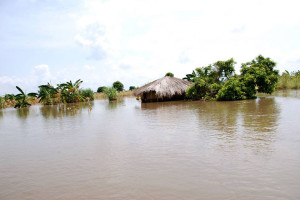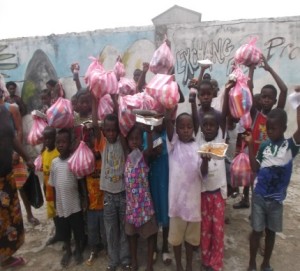Megan Brandsrud
This is a guest post from Rev. Linda Johnson Seyenkulo, an ELCA missionary to Liberia.
I’ve been thinking about the Good Samaritan story lately and the concept of neighbor.
“Who is my neighbor?” the Pharisee asked Jesus. Even if we are not well-versed in Christian faith or the Bible, we know the story of the Good Samaritan and the definition of neighbor. Or do we?
Recently, I was called as a missionary to Liberia, West Africa. Due to the terrible Ebola epidemic that has swept West Africa – most especially Liberia, Sierra Leone and Guinea – I found myself back home in Minnesota, where I grew up. For a time, I was living in the Minneapolis/St. Paul area of Minnesota. It sounds weird, but I was a missionary to Liberia deployed to Minnesota. I soon found myself connected with the Liberian community in Minnesota, which is home to the largest Liberian immigrant community in the U.S. Approximately 30-40,000 Liberians live and work in Minnesota, many of whom have been in the Minneapolis area for more than 20 years.
Seeing the reality of life for Liberian Minnesotans, given the Ebola crisis in West Africa, brought to mind the concept of neighbor and how it has been playing out in their lives. I had several opportunities to worship, preach and speak at services and events held in Lutheran churches. During some of those opportunities, there were Liberian Minnesotans present and I heard stories about how Ebola in West Africa has affected the Liberian community in Minnesota.
At a memorial service for victims of Ebola attended by about 500 people, there were stories of loss and of Ebola victims who were loved. We heard from the fiancée of the man who died in Dallas, Texas. One man shared about losing 7 family members to Ebola. He and others prayed and testified.
The stories were hard to hear, but what was even harder to hear were the stories of children being bullied at school because they are Liberian and might have Ebola. Or stories from adults who were sent home from work for sneezing or coughing because they are Liberian and might have Ebola. And stories of people’s long-time co-workers and friends (some as long as 20 years) becoming distant and fearful around them because of Ebola. These are people whose only connection to Ebola is that they are Liberian and have relatives living where the epidemic is.
At Lutheran church services in Minneapolis and St. Paul, people shared the same stories of bullying and being ostracized because of being Liberian.
To top it off, a local politician ran an ad the night before the elections in Minnesota, telling people his opponent would not be able to protect them from Ebola (and by extension seemed to say, “Be afraid of your Liberian friends and neighbors.”)
I need to say that during this same time, the Bishop of the Minneapolis Area Synod spoke at the memorial service for Ebola victims. The Bishop of the St. Paul Area Synod wrote a pastoral letter detailing the realities facing our Liberian brothers and sisters in Minneapolis/St. Paul and the surrounding communities to the congregations under her care. These actions were very important because Lutherans abound in Minnesota and their witness is key to living as neighbors together. It was a start, from a certain level of the Lutheran church. Some of the congregations I met with, many of them fairly recent immigrant churches (within the last 100 years), are starting to be home to more recent immigrants. In addition, a few Liberian Minnesotans shared stories about friends who had not turned away.
In the story of the Good Samaritan, the man from Samaria overlooked everything that his culture and social structure told him. Instead, he saw someone who was human, like him, and needed relationship.
What we sometimes overlook is how hard it is to be neighbor to people who seem different from what we know—especially when that difference is connected to fear and stereotypes that fill our senses. Being a neighbor is a hard and time-consuming process that moves us away from seeing difference and into being connected in real and meaningful ways. It’s living in love, risking in love, being connected in love. Remember, love casts out fear. Things like our fear of Ebola, what we see in media reports about people, and even popular opinion can’t be allowed to take over and keep us from real and true relationship with the neighbor.
I found myself thinking how different some situations would have been if we asked, “Who is my neighbor, and what does it mean to be a neighbor?” Those are not abstract, academic questions. They are a basic part of being a Lutheran Christian; a basic ethic of how to live the way of Jesus. Jesus said, “Love your neighbor as yourself.” It is as simple and as difficult as that.


